Love Island: Will social media ban protect islanders?
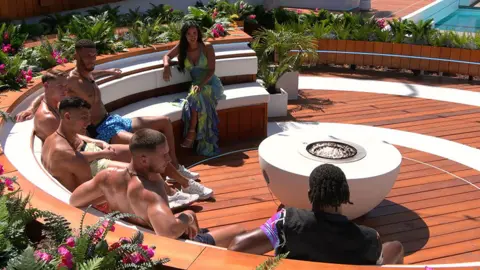 ITV/Shutterstock
ITV/ShutterstockBikinis, drama and love triangles - the UK's most popular dating show, Love Island, is back on screens later.
Ex-Radio 1 DJ Maya Jama will be fronting the show's winter edition - following in the footsteps of Laura Whitmore and the late Caroline Flack.
But for the ninth series there's more than just a new presenter: there's a major rule change.
Contestants now won't have friends and family running their social media accounts - instead, ITV has requested that they stay dormant.
That means no more sharing memes, and no more statements posted on the islanders' behalf.
Love Island dominates social media feeds whenever it airs, and with contestants shut off inside the villa it's often left to friends and family to deal with any negativity.
In the past relatives have posted pleas for people to be kinder as islanders face trolling.
ITV's hoping to change that, and the social media rule is the latest change it's made as part of efforts to step up support for contestants - and their loved ones.
But what do former islanders and those who've been left to battle the backlash make of the change?
'Emotional rollercoaster'
Since 2019 - and following the deaths of previous contestants Mike Thalassitis and Sophie Gradon - bosses have offered islanders a minimum of eight therapy sessions after their time on the show.
Psychologist Jo Hemmings, who has worked behind the scenes on a variety of reality TV shows, tells BBC Newsbeat that Love Island now has a "gold standard" when it comes to duty of care.
"I think the protocols, particularly the one about pausing the social media accounts, will certainly help the families or people managing those accounts," says Jo.
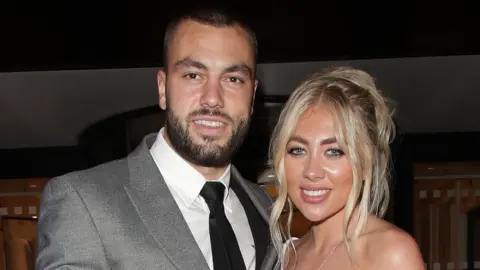 Getty Images
Getty ImagesPaige Turley, who won the first Winter Love Island series with boyfriend Finn Tapp after they met in the villa, tells Newsbeat account runners go through "more of an emotional rollercoaster".
"Islanders in the villa don't see people's reactions to each episode.
"And a lot of family and friends have their own full-time job, so social media in itself is a full-time job.
"So having to keep up with posting, and the reactions of the outside world, it was more of an emotional rollercoaster for them really.
"If anything, it's going to give the family and friends a bit of an easier journey."
Finn, whose best friend ran his accounts, says "it's quite a stressful thing," for those back home.
"I think he then recruited a few of my family members to help. There was a whole squad of them in a group chat [deciding] on what to post."
Blocking trolls
Faye Winter was a contestant on the 2020 summer series of Love Island. She made the final with Teddy Soares.
"I was actually really surprised at how much welfare was included in every aspect of leading up to the show, how often I spoke to somebody," she says.
"If I was feeling anxious, they always said 'you can call us' if there's anything that you're worrying about.
"We spoke to welfare every day in the villa. And then afterwards, they were absolutely brilliant.
"Again, you got your eight sessions of counselling, and I continued my counselling with the same therapist, that's how good it was."
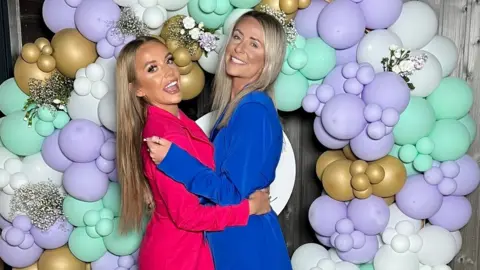 Faye Winter
Faye WinterWhile Faye has a huge following on social media, her time on the show created headlines and backlash. One argument with Teddy prompted 25,000 Ofcom complaints - Faye later apologised.
Jo - her older sister - was running her account at the time.
"I'm not naïve to social media," Jo - who works in marketing - says.
"Faye did get quite a bit of trolling, but between between me and her team we were able to use blocked words."
Jo says she would swap messages with other islanders' families to discuss strategies.
"Which is bizarre, because you haven't actually met them, or their son or daughter or friend or sister or brother.
"Once one of us had learned, you know, block these words, then it kind of would be a snowball effect."
Jo thinks the new social media rule is a positive move.
"I think that people will have an opinion, whether that be good or bad," she says.
"But I think actually, it's an opportunity for you to sit and watch your loved one on telly, because it's bizarre enough they're already on your TV screen."
'Fans are demanding'
Chyna Mills - who was on the last series - says she was worried for her sister, who ran her account while she was in the villa.
"Whilst being inside of the villa, I was constantly worrying about if my sister could handle running my social media accounts.
"She said to me it was the most stressful thing ever, because you have fans that are very demanding, and they want to see more of you - that hour that they see on the show, it's not enough for them."
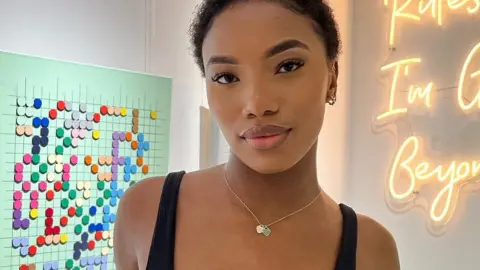 Chyna Mills
Chyna MillsVictoria Sanusi ran an account of a friend who was on Winter Love Island.
"What you don't see is when the islander gets a bad edit or the show focuses them in their 'villain era', or doing something outlandish, it really does correlate to their account.
"So they will have all this abuse on the message inside their DMs.
"I'm a friend managing it - so imagine like a mother or a dad having to see those messages about their child. That's awful."
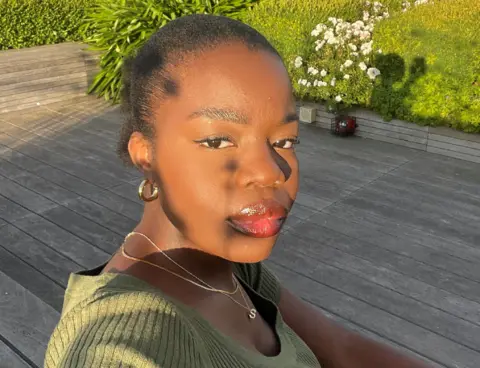 Victoria Sanusi
Victoria SanusiVictoria says she saw "really vile" messages, with some even telling the contestant "not to be here anymore".
This is what Brett Staniland - an islander who was on the 2020 series - is concerned about.
"I think [the rule change] is potentially a bad thing because it can create a backlog of hate and abuse that can be piled up just in time for them getting their phone back," he says.
"And what will happen is they'll become extremely overwhelmed."
Pure love?
Some people have highlighted another potential side-effect of contestants' social media silence: picking up fewer followers if their account isn't active.
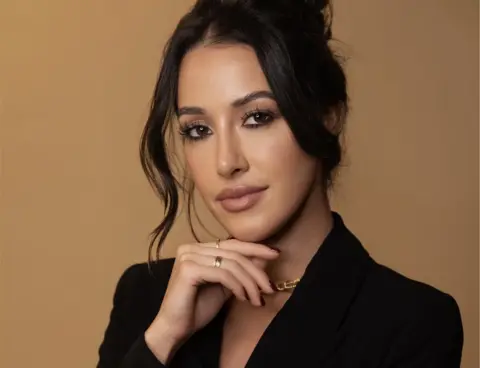 Rizzo Publicity
Rizzo PublicitySaffron Rizzo, founder of talent agency Rizzo Publicity, estimates that islanders who make the final can earn up to seven figures for sponsored posts once they leave the villa.
"I think it could have an effect on the commercial value of the contestants and it could impact our industry," she says.
"I do believe the rule is the right decision to protect the contestants, their families and their loved ones."
But, with less of a focus on social media this series, there could be a positive - more genuine relationships on the show.
"It makes it feel a bit more pure actually, knowing they can't just use it as a launch pad to fame," psychologist Jo says.
Newsbeat has approached ITV for comment.


